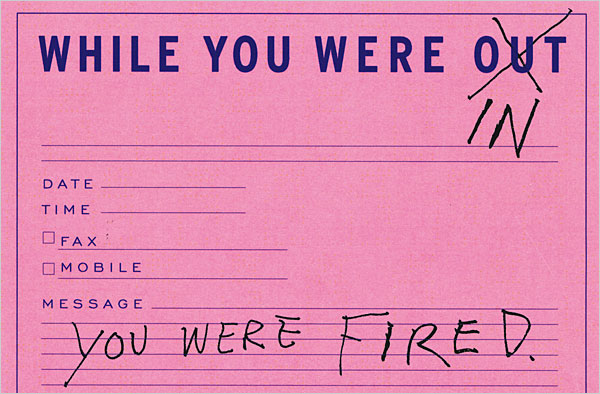
Welcome to layoff season! It’s the unhappiest time of the year between Columbus Day and Christmas when employers slash costs to make way for end of the year profits by decking the halls with pink slips. Sure, you might have seen that last Friday the official unemployment rate dropped to 5.8 percent. But don’t be fooled: Last month, employers also sent 50,000 people in all sorts of industries to the unemployment line.
Finding yourself suddenly without a paycheck can be terrifying — especially if you live paycheck-to-paycheck in an expensive place like Brooklyn, where rents have become ridiculous. You don’t have to be gripped with fear about becoming a statistic, however. There are things you could do right now to cushion the blow if the axe is coming for you.
I spent six years preparing for my own layoff as a producer at a cable news station (more on that later), where I could see the writing on the wall as I survived round after round of cuts. What did I do to get ready?
DON’T PUT ALL YOUR MONEY EGGS IN ONE JOB BASKET
Simply, I found things I liked to do that people would pay me for. I didn’t earn a ton of money at first but it was enough to pad my emergency savings account from four months of expenses to six months’ worth of expenses (what experts recommend, FYI) and eventually much more.
As a journalist covering the 2008 financial crisis and the resulting Great Recession, I became increasingly worried about the future of my own job and career. Reporting on the demise of Lehman Brothers and the growing number of companies slashing their workforce got me thinking about what I would do if my job was downsized. I was lucky that I had the luxury of nine months to ponder that question and the foresight to consult with my professional and social network about the skills I had that would crossover to other fulfilling careers.
Never the one to take the easy road — which I suppose would have been PR — a surprising but thoughtful answer emerged from those discussions: financial planner.
INVEST IN FUTURE YOU
So I looked into the education required and decided to enroll in the Fundamentals of Financial Planning at NYU.
I went to school at night and my employer reimbursed me for half the cost of tuition on condition that I got a B or better (for the record, I got an A). If your company offers one, take advantage of that employee reimbursement while you can
I was hooked and finished the entire program while I was still had my job. I also managed to study for and sit the 10-hour CFP (r) exam (the national examination every Certified Financial Planning Professional is required to pass), passing the first time, while remaining employed. I even started my own financial planning practice and began teaching classes on money while still working in the newsroom.
THINK AHEAD
If you have a job, now is the time to plan what you would do if you lost it. Would you stay in the same profession? Would you change careers? Would you go back to school? How would you pay for your education? What would you live on if the job hunt took longer than expected?
Maybe you just lost your job and are having a hard time figuring out your next move. Or maybe you want to jump ship before you’re pushed but need to figure out how to reach dry land safely. I’ll be addressing the steps you need to take to make it to the other side in my next class at Brooklyn Brainery on Nov. 22, How to Survive a Layoff: Preparing Your Money and Career for a Pink Slip.
For the price of a cold Woodchuck Hard Cider at some bars ($8) you’ll learn tips for negotiating severance, dealing with health and unemployment insurance, what to consider before rolling over your 401k as well as a lot of useful job hunting pointers and career advice.
Finally, at the end of May this year I packed my boxes and said goodbye to my colleagues at the network, after finally being laid off from CNN: More than two dozen of use became casualties in that round of job cuts. There have since been 300 additional layoffs and dozens of buyouts.. (My unit, the Money Unit, was scrapped and the few survivors were folded into the digital unit.)
The 14 plus years as a television news producer at CNN came to an end. But I was ready for it. I had prepared for this moment for so long.
Stephanie Genkin is a financial planner and television producer. She offers monthly classes and workshops on money topics at Brooklyn Brainery. Here is a partial listing of her past classes.
Leave a Reply



